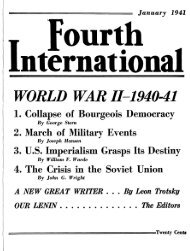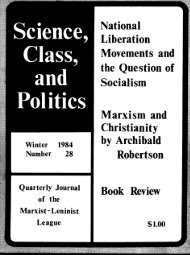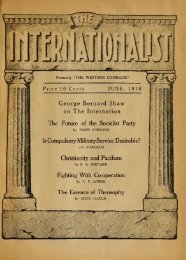The Stalin school of falsification - Marxists Internet Archive
The Stalin school of falsification - Marxists Internet Archive
The Stalin school of falsification - Marxists Internet Archive
Create successful ePaper yourself
Turn your PDF publications into a flip-book with our unique Google optimized e-Paper software.
<strong>Stalin</strong> School <strong>of</strong> Falsification - Chapter 5<br />
<strong>of</strong> the Soviet forces and the need <strong>of</strong> a breathing spell, Lenin stood for signing the proposed peace treaty,<br />
even though it meant agreement to Russia's being desp<strong>of</strong>led <strong>of</strong> vast territories and forced to pay tribute to<br />
the Germans. Bukharin and his group (including Inessa Armand, A. Bubnov, Bela Kun, Alexandra Kol<br />
lontai, Kuibyschev, N. Muralov,M. N. Pokrovsky, Preobrazhen sky, Piatakov, Radek, Uritsky, etc.),<br />
opposed the acceptance <strong>of</strong> the peace terms and advocated a revolutionary war against the Germans.<br />
Trotsky, recognizing the exhaustion <strong>of</strong> the armed forces <strong>of</strong> the Soviets, proposed that the war be declared<br />
at an end, that the peace treaty be not signed, and that if the Germans continued to advance, the terms be<br />
accepted "at the point <strong>of</strong> a bayonet," in order to show the international and especially the German work<br />
ing class t~at the Soviets had held out against German imperial ism till the very last. Trotsky's<br />
formula-"Neither war nor peace" — was, for example, exactly the status for years to come <strong>of</strong> relations<br />
between Russia and Roumania. At first Lenin was in a minority in tile leadership and the ranks. <strong>The</strong><br />
principal Soviets in the country (except for Petrograd and Sebastopol) expressed themselves against<br />
signing the treaty (thus, Moscow, Ekaterin burg, Kharkov, Kronstadt, etc.). On January 21, 1918, at a<br />
conference in Petrograd <strong>of</strong> active leaders throughout the country, with 68 present, the revolutionary war<br />
position received an absolute majority <strong>of</strong> 32, the Trotsky position ("Neither war nor peace") 16, and the<br />
Lenin position 15. At the very last moment, when the Germans had resumed their advance and given<br />
their final ultimatum, the Central Committee session carried Lenin's proposal to sign the treaty. At the<br />
February 23 meeting, Lenin, Zinoviev, Sverdlov and Sokolnikov voted to sign, with Bukharin,<br />
Dzerzhinsky, Uritsky and Lomoy voting against. Trotsky stated:<br />
"If there were unanimity among us, we could proceed with the organization <strong>of</strong> the defense and would do<br />
a good job <strong>of</strong> it. .<br />
But this requires a maximum <strong>of</strong> unity. But since this unity does not exist, I cannot assume the<br />
responsibility for voting in favor <strong>of</strong> war." <strong>The</strong> C.C. thereupon decided by 7 votes to 4, with 4 abstain ing<br />
(Trotsky's abstention gave Lenin the necessary majority) to accept the German proposal instantly. At this<br />
session, it was <strong>Stalin</strong> who declared: "It is not necessary to sign, but we can begin peace negotiations" —<br />
a position which Lenin attacked. <strong>The</strong> "Left Communists," Bukharin, Lomov, Bubnov, Yakovlev,<br />
Piatakov and V. Smirnov thereupon announced their withdrawal from all responsible party and Soviet<br />
posts in order to be free to carry on their agitation against the decision in the ranks <strong>of</strong> the party; in the<br />
name <strong>of</strong> the Moscow Party Committee controlled by them, they issued Kommunist as a faction organ in<br />
which a violent polemic was conducted for several months against Lenin's course. <strong>The</strong> signing <strong>of</strong> the<br />
Brest Treaty also had as one <strong>of</strong> its results the withdrawal <strong>of</strong> all the Social Revolutionary Commissars<br />
from the Soviet Government, followed by an armed uprising <strong>of</strong> that party against the Bolshevik régime.<br />
[BACK TO TEXT]<br />
19. <strong>The</strong> N.E.P. (New Economic Policy) was adopted, on Lenin's initiative, by the Tenth Congress <strong>of</strong> the<br />
Communist Party <strong>of</strong> Russia, early in 1921, and re-enforced at the Tenth Party Conference in May <strong>of</strong> the<br />
same year. Not only had the post-war revolutionary wave in Europe subsided, especially after the fail ure<br />
<strong>of</strong> the Red drive on Warsaw, but relations with the peasantry in Russia had become strained to the<br />
breaking point. <strong>The</strong> ex tremely rigorous regulations <strong>of</strong> so-called War Communism (requisitioning and<br />
confiscation <strong>of</strong> grain from the peasant), accompanied by the breakdown <strong>of</strong> industry consequent upon the<br />
ravages <strong>of</strong> the civil war (in 1920, industrial output was only 18 per cent <strong>of</strong> the pre-war level; in heavy<br />
industry, specifically, the situation was far worse), had brought the alliance <strong>of</strong> the workers and peasants<br />
to extreme tension. <strong>The</strong> Tenth Congress met dur ing the Kronstadt rebellion, which reflected the intense<br />
discon tent <strong>of</strong> the peasants. Lenin proposed a policy <strong>of</strong> substituting a tax in kind for requisitions; <strong>of</strong><br />
allowing the peasant to dispose <strong>of</strong> his surplus within the limits <strong>of</strong> "local trade"; <strong>of</strong> allowing the<br />
http://www.marxists.org/archive/trotsky/works/1937-st2/sf05.htm (17 <strong>of</strong> 20) [06/06/2002 15:06:23]

















